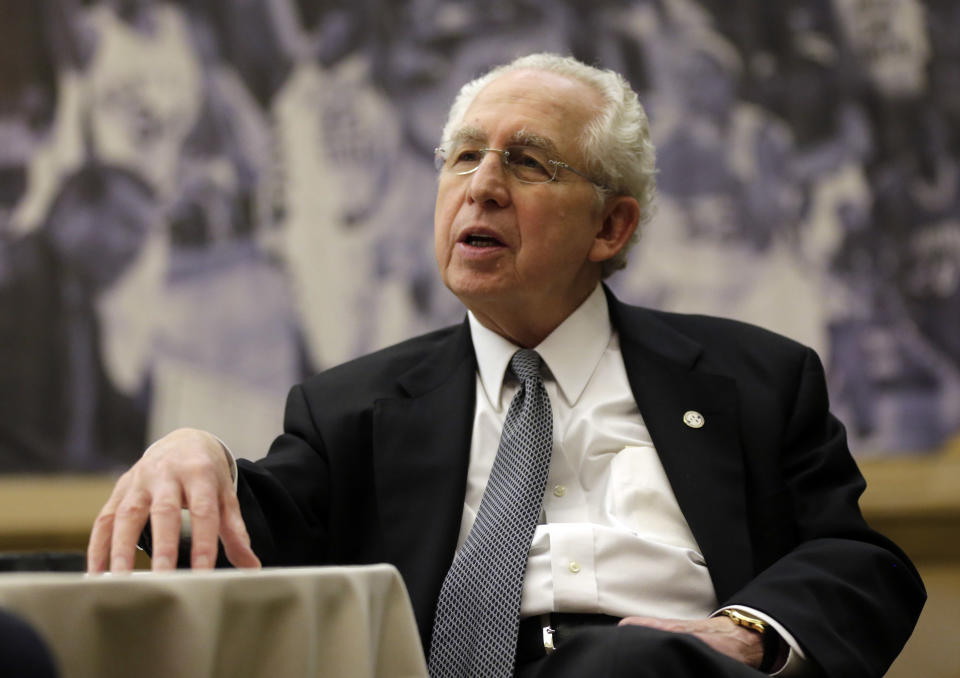How Mike Slive helped make SEC king while staying true to himself
Mike Slive didn’t just acknowledge the absurdity of his late-life, late-career position that no one could ever have planned for, let alone predicted. He even greeted it with the kind of warm, playful, in-on-the-joke grin that made him so successful.
Here he was, a slight man of Jewish faith and Ivy League education, raised in Central New York, who worked as a lawyer in Chicago and a judge in New Hampshire, somehow finding himself in charge of the cultural heartbeat of the Good ol’ Boy South – SEC football.
And not just in charge, but the man that through intense intelligence, gentle guile and a canny ability at consensus-building wrestled its warring factions and suicidal instincts into a period of rocket-fueled success – on the field and, just as importantly, in the accounting ledger.
Slive died Wednesday at the age of 77 and his legacy in the history of both the SEC specifically and the NCAA more broadly is nearly peerless.
Figuratively, if not physically, he was a giant of the game.
The SEC has always won football games and always made money, but in the period before Slive took over as its commissioner in 2002, it was also constantly being held back by NCAA violations, rogue characters and a culture of spite-filled infighting. It was an underachieving soap opera. At one point in the late ’90s, two-thirds of the league was in some part of the NCAA enforcement pipeline – from under investigation to serving out probation.
Slive believed the SEC’s true potential rested on its ability to overcome its internal squabbles and see itself as a team, one where high tides (Crimson or not) could raise all boats. Compliance needed to be a focus, demanded the “recovering lawyer” (as he put it) who used to represent schools in NCAA matters. So too did ending disputes before they became wars.
“We were a regional league,” Slive said. “I thought we should be a national one.”

By the time he was done, the league was finding itself in no more trouble than anyone else – at one point he nearly managed to have all of his then-12 league schools in the clear (no easy feat for any commissioner). More importantly, television ratings were through the roof, four different league teams combined to win seven consecutive national titles from 2006-2012 and each one was greeted with unified chants of “SEC, SEC.”
Across the South the SEC replaced NASCAR as its most popular cultural phenomenon.
The entire place changed. As attention and accomplishment grew, so too did applications from across the country, kids from the North heading to the South to get in on the fun they saw each Saturday on CBS. Alabama, for one, now enrolls more students from out of state than from within.
Suddenly Slive had his league on equal footing economically (and far ahead competitively) with the mighty Big Ten, creating a rivalry with commissioner Jim Delany that impacted college athletics everywhere, via expansion, competition over media rights and the creation of a playoff.
That was Slive though. He was the soft-spoken, deep-thinking ringmaster to the circus, capable of earning the respect of all. Nick Saban sought his counsel. Steve Spurrier professed his love. Urban Meyer trusted his advice. Maybe no one else could have managed this other than him.
When things got sideways a little, Slive could defuse it in a phone call because of the gravitas he brought and the groundwork of friendship he had built. When he was the head coach of Tennessee, Lane Kiffin was causing some type of tumult each week, until Slive told him to knock it off. Kiffin did.
There was more. When he arrived, the SEC had never had a black head football coach. Slive pushed hard for schools to consider a more diverse candidate pool and by 2003 Mississippi State hired Sylvester Croom. Slive drove hard for a further commitment conference wide to women’s sports, and the SEC has become a powerhouse in nearly everything these days.
Slive always laughed and tried to brush aside the idea that he was the most powerful man in college sports, but if he was, it was because he saw the potential of the South. Perhaps that’s what was needed, an outsider’s view of what the region could do if it worked together rather than fought each other, a why-not-us sensibility.
He saw potential in everyone. He saw a worth in anyone. He was famous for his heartfelt conversations with everyone associated with the game – stopping in at tailgates, greeting the players and hobnobbing with the media.
He forever sought improvement in football – “You want to leave things better than you found it.” He was focused on player safety long before it became cool. His willingness to buck entrenched interest and push for a playoff drove its eventual creation.
When expansion was needed, he deftly extended the league’s footprint into Texas and Missouri and created a revenue stream in the SEC Network. For once, the SEC was the aggressor, the one setting the tone, not the backwater league for the rest of the country to mock.
He did all that while maintaining his dignity, his humor and his humility. Ask him about what he accomplished in the game and he’d quickly start telling stories about his daughter and later his granddaughter. He was a deft administrator, yet he was always a person first.
In college athletics, that combination can be rare.
In Mike Slive, the unlikely king of the South’s cultural home, it all seemed so natural.
More from Yahoo Sports:
• 25-year-old arrested for posing as HS basketball star
• Golfers play on while volcano erupts
• Michigan State settles with Nassar victims for $500M
• ’F—ing thief’: Cavs player doesn’t hold back about Boston GM
